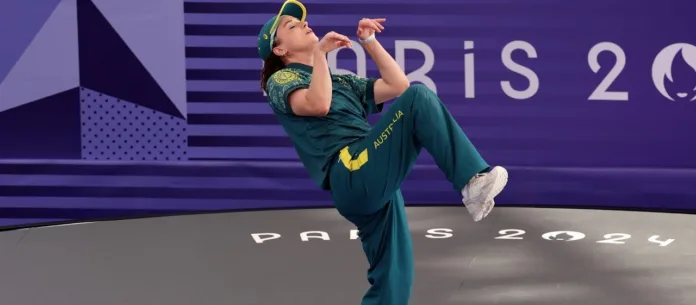Rachael Gunn, known as B-girl Raygun, struggles with intense online hate and media criticism following her performance at the Paris Olympics, calling for privacy and respect for her and her supporters
Australian breakdancer Rachael Gunn, who competes under the moniker B-Girl Raygun, has been at the centre of a storm of criticism following her debut at the Paris Olympics. The inaugural inclusion of breaking, or breakdancing, in the Olympic Games was meant to spotlight the sport, but Gunn’s participation has instead drawn an overwhelming amount of negative attention.
Gunn, who lost all three of her round-robin battles in Paris, has faced ridicule from both social media users and mainstream media outlets. The harsh criticism has taken a toll on her well-being, as she shared in a heartfelt Instagram post on Thursday. “I really appreciate the positivity and I’m glad I was able to bring some joy into your lives. That’s what I hoped,” she wrote. “I didn’t realise that would also open the door to so much hate which has, frankly, been pretty devastating.”
The backlash intensified when an online petition emerged, calling for an investigation into her selection for the Olympics. This petition, which amassed over 54,000 signatures, accused Gunn of being unqualified and questioned the transparency of her selection process. The Australian Olympic Committee (AOC) swiftly condemned the petition, denouncing it as “vexatious, misleading, and bullying.” AOC chief executive Matt Carroll emphasized that Gunn’s selection had followed a transparent and independent process and was grounded in fairness.
In response to the intense scrutiny, Gunn has requested privacy for herself, her family, and her supporters. “I’d really like to ask the press to please stop harassing my family, my friends, the Australian breaking community, and the broader street dance community,” she stated. She also highlighted that everyone involved has been deeply affected by the situation and urged respect for their privacy during this challenging time.
Gunn plans to take a short break in Europe, a trip she had already scheduled before the Olympics. She intends to address further questions upon her return to Australia. The Change.org petition demanding an apology from Gunn has since been removed following the AOC’s intervention.
As breakdancing will not be included in the sports program for the 2028 Los Angeles Olympics, the controversy surrounding Gunn’s performance may have lasting implications for the sport’s representation and the public’s perception of it.
Analysis:
Political:
The controversy surrounding Rachael Gunn’s Olympic performance has political ramifications, particularly for the Australian Olympic Committee and the future of breakdancing as an Olympic sport. The intense scrutiny of Gunn’s selection highlights underlying tensions regarding how athletes are chosen for international competitions. The AOC’s condemnation of the petition and the subsequent removal of the petition from Change.org reflect a broader political effort to manage public perception and uphold the integrity of the selection process. This incident underscores the pressures faced by sports organizations in ensuring transparency and defending their decisions against unfounded criticism.
Social:
Socially, the backlash against Gunn mirrors broader issues of public scrutiny and online harassment. The intensity of the criticism she faced has brought to light the darker side of social media and its impact on individuals, particularly public figures. The situation has sparked discussions about the responsibilities of media and the public in treating athletes with respect. It also highlights how the public’s expectations and criticisms can profoundly affect an individual’s mental health and personal life. Gunn’s plea for privacy underscores the need for empathy and consideration in how we engage with and critique those in the public eye.
Racial:
Rachael Gunn’s experience also intersects with racial dynamics. As an Australian of Asian descent, Gunn’s visibility as a breakdancer on the global stage adds complexity to the racial dimensions of the backlash she faced. The criticism she received may reflect broader issues of racial representation and biases in sports. It is crucial to examine whether her racial identity influenced the nature of the criticism or the public’s response to her performance. The incident serves as a reminder of the need for diversity and inclusivity in how athletes are perceived and supported in international arenas.
Gender:
The gender aspect of the controversy is significant, as Gunn is a female athlete in a field that has historically been dominated by men. The scrutiny she faced can be seen as part of the broader challenges women encounter in sports, where they often face higher levels of criticism and pressure compared to their male counterparts. The focus on her performance and the subsequent backlash may reflect entrenched gender biases in sports coverage and public perception. Gunn’s situation highlights the importance of addressing gender disparities and fostering a more supportive environment for female athletes.
Economic:
Economically, the controversy impacts not only Rachael Gunn but also the broader field of breakdancing. The negative attention and the removal of breakdancing from the 2028 Olympic program could affect sponsorships, funding, and the sport’s growth. The backlash may deter future athletes from pursuing breakdancing as a serious competitive sport, impacting its financial viability and visibility. The situation illustrates the economic implications of public perception and the challenges faced by emerging sports in securing long-term support and recognition.
